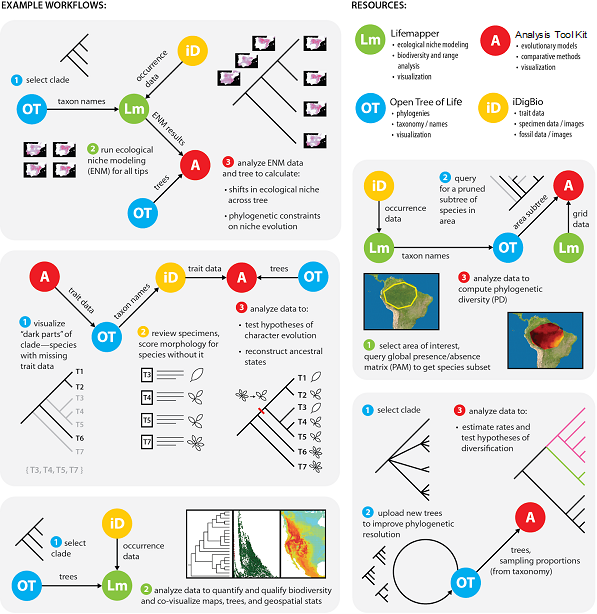
Do you want to learn how to use occurrence data and available software to address questions in ecology and evolutionary biology but haven’t had a chance to take a course and are overwhelmed by the options for self-teaching? Would you like to incorporate this sort of research into your classes but don’t have time to create the materials and examples? If either of these applies, then join the BiotaPhy Project for an upcoming series of 10 webinars designed to take you from biological question to data acquisition and cleaning to analysis and interpretation!
BiotaPhy is a collaboration among iDigBio, LifeMapper, and the Open Tree of Life. Learn more about the project and register for the webinar series here.
Webinars will be held Wednesdays at 12:30 pm Eastern time, beginning September 21. All webinars will be recorded and made available, so you won’t get behind if you need to miss a session. The schedule is:
Webinar 0: Terms, Concepts, Data Formats – A Tutorial for Background
Click here for PDF
Webinar 1: Introduction: Scope and Research Potential for Multidisciplinary Biodiversity Modeling and Analysis
Date: 9/21/2022
Recording
Click here for PDF
Webinar 2: Resolving Nomenclature: Making Appropriate Taxonomic Choices
Date: 09/28/2022
Recording
Click here for PDF
Webinar 3: Clean Your Dirty Data
Date: 10/05/2022
Recording
Click here for PDF
Webinar 4: Georeferencing with GEOLocate
Date: 10/12/2022
Recording
Click here for PDF
Webinar 5: Big Data Munging (a.k.a Splitting and Merging Occurrence Data by Taxa from Multiple Sources)
Date: 10/19/2022
Recording
Click here for PDF
Webinar 6: Species Distribution Modeling 1
Date: 10/26/2022
Recording
Click here for PDF
Webinar 7: Species Distribution Modeling 2
Date: 11/02/2022
Recording
Click here for PDF
Webinar 8: Introducing Presence-Absence Matrices for Large Scale Analyses
Date: 11/9/2022
Recording
Click here for PDF
Webinar 9: Phylogenetic Diversity: Integrating Phylogenies with Species and Biogeographic Data
Recording
Click here for PDF
Date: 11/16/2022
Webinar 10: Hypothesis Testing and Randomization
Date: 11/30/2022
Click here to register for the webinar series.

Overview of the BiotaPhy Project
Heightened awareness of the importance of maintaining ecologically diverse natural areas has increased urgency for scientists to identify and explain the biological dimensions and services of the environment that are vital for supporting human populations and sustaining prosperity. Biological diversity, or the distribution, function, and interdependency of species, is a vital dimension of natural systems upon which the sustainability of human systems depends. The biological diversity of Earth's natural habitats has been inventoried for over 300 years by intrepid biological explorers. The species information produced by those surveys, derived directly from biological specimens, tissues, and DNA samples, is now being rapidly amassed in internet information systems. The data represent a monumental and unparalleled source of information about the origin, distribution, and diversity of life on Earth. With over a billion species occurrence database records online, internet-accessible information on the evolutionary relationships of millions of species in the online Tree of Life database, online global climate data, and supercomputing capabilities, biodiversity researchers are enabled for the first time, to analyze questions about the ecological and evolutionary factors that shape patterns and properties of biodiversity on the scale of continents and the entire globe. That knowledge will produce insight for public understanding and policy vital to the conservation and sustainability of diverse natural and human systems. In addition to facilitating research, the BiotaPhy Project is committed to the development of a scientifically literate public and plans educational, training, and outreach activities to address multiple constituencies. It will provide collaborative post-doc, graduate, undergraduate, and high school training in data-intensive biodiversity science while building on a strong record of recruiting members of underrepresented groups.
This project will undertake software engineering, open-access, deployment and training for the BiotaPhy computational workflow environment on the web. The Platform will be supported as a biodiversity community gateway for data-intensive science. The software will enable integrative and powerful analyses, and quantitative models of the geographical patterns of Earth's species diversity past, present, and future. BiotaPhy software will enable scientists to address novel questions relating phenotypic and ecological biodiversity, community assembly, and species diversification across time and space. The computational workflows will have broad environmental research relevance and the potential for transformative impact on data-intensive research spanning ecology, phylogenetics, systematics, and conservation biology. The BiotaPhy workflow platform will provide those capabilities by assembling input datasets, computing single species distribution models and multispecies macroecological datasets, and then output statistical tests of evolutionary and ecological hypotheses to a graphical web interface for review and knowledge discovery. The BiotaPhy Platform?s production deployment will: (1) increase research into and creation of new synthetic approaches at the interface of phylogenetics, ecology, evolutionary biology, and biogeography; (2) increase the accessibility and utilization of Open Tree of Life, iDigBio, and Lifemapper resources; (3) incorporate community input and training; and (4) build and support cross-domain data integration services as sustainable biodiversity community infrastructure. The BiotaPhy Project can be accessed at http://biotaphy.github.io.
Questions can be directed to Maria Cortez at mariacortez@ufl.edu or Pamela Soltis at psoltis@flmnh.ufl.edu.







